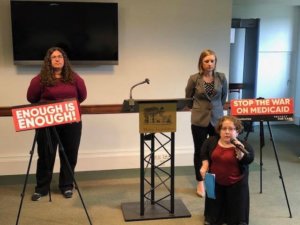Throughout the fourth and final week of Medicaid Awareness Month, advocates across the country highlighted the significant role Medicaid plays in supporting Americans with disabilities, and spoke out against Republican proposals to weaken and cut Medicaid.
How does Medicaid help Americans with disabilities? Here are some of the many ways:
- 8.7 million nonelderly adults with disabilities depend on Medicaid for care. Nearly 8.7 million adults enrolled in Medicaid have a disability. Of this group, only 43 percent qualify for social security income.
- More than 1 in 3 adults under age 65 enrolled in Medicaid lives with at least one disability. Nearly 45 percent of adults with disabilities have Medicaid coverage. Medicaid covers 45 percent of nonelderly adults with disabilities, including adults with physical disabilities, developmental disabilities, brain injuries, and mental illness.
- Medicaid covers nearly a third of adults with disabilities. 31 percent of U.S. adults with disabilities have Medicaid coverage.
- More than half of adults with disabilities covered through Medicaid earn less than 100 percent of the federal poverty line (FPL). A majority, 52 percent, of adults with disabilities who have Medicaid coverage earn annual incomes of less than l 00 percent of the FPL, $12,060 for an individual, and could not afford needed care without the program.
- Medicaid helps people who need long-term care to stay in their communities. Of nonelderly people with disabilities who rely on Medicaid for long-term care, 80 percent receive community-based care, while only 20 percent receive institutional care.

At the Main State House, Nancy Cronin, the Executive Director of the Maine Developmental Disabilities Council, Sara Squires, the Public Policy Director of Disability Rights Maine, and Rebecca London, the State Director of Protect Our Care Maine, held a press conference to discuss how Medicaid benefits Americans with disabilities.
Dawn Alford, Public Policy Director, Georgia Council on Developmental Disabilities, posted Medicaid: A Lifeline to the Community on Community Catalyst’s Health Policy Hub to highlight the importance of Medicaid to Georgians with disabilities.
A new survey from Public Policy Polling found that voters nationally strongly support Medicaid and are opposed to cutting it, especially to fund tax breaks. Among its findings:
- 66% of voters oppose cutting Medicaid, as opposed to just 19% who support cuts. 74% of Democrats and Independents oppose cutting Medicaid, while a plurality of Republicans, 49%, also oppose cuts. In fact, only 34% of Republicans support cutting Medicaid.
- 71% of voters overall say they are opposed to cutting Medicaid to fund the GOP tax scam which passed last year, including 82% of Democrats, 70% of Independents, and 60% of Republicans.
- A majority of voters (52%) want to see Medicaid expanded, compared to just 35% who don’t.
- Learning that Medicaid covers 6 in 10 nursing home residents and 40 percent of costs for long-term care that seniors depend on made voters 63% less likely to support cuts. Voters were 53% less likely to support cuts after learning that if Medicaid funding is cut, 1 in 5 Americans – seniors, children, and individuals with disabilities – will be at risk of losing access to healthcare.
Leading advocates hosted press calls across the country to convey just how important Medicaid is to those with disabilities in communities across the country. In Nevada, parents from the organization Positively Kids spoke of the role it plays for their children with disabilities; in Tennessee, community leaders discussed how Medicaid supports Tennesseans with disabilities; and in Ohio, local physicians and health care experts called out gubernatorial candidate Mike DeWine’s refusal to clarify his Medicaid position and explained the problems which would occur should the state’s expansion be rolled back.
And as Medicaid Awareness Month wraps up, the Conway Daily Sun published a comprehensive overview about the importance of Medicaid to New Hampshire communities and shared information about how to enroll.

